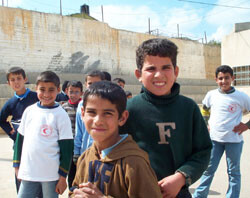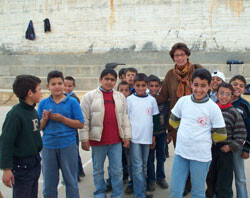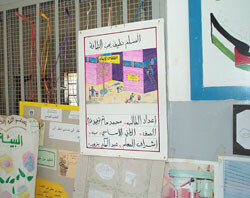Tubas 2 April 2004

The smiles of these Palestinian children often masks psychological troubles linked to the conflict (Photo: IFRC)
The project is designed to help children cope with the psychological stress caused by the conflict in the Palestinian territories.
�Most children in Tubas have witnessed terrible things that sometimes have a long term psychological impact,� says Marianne Celinder from the Danish Red Cross, who advises the psychosocial project in Tubas. �The CABAC project aims to help them get through these difficulties without suffering irreversible damage to their mental health.�
The parents of schoolchildren in Tubas say the conflict has had a very strong impact on their children. Many of them have constant fear and worries, not only during bombardments and shootings, but also for long periods afterwards.

Marianne Celinder of the Danish Red Cross, who advises the psychosocial project in Tubas, with some of the children who have benefited from the scheme (Photo: IFRC)
Marianne sighs as she remembers this incident. �This kind of event can cause severe shock to children, and it often takes them a long time to recover.�
�They don�t understand what is happening, and they see that their parents are also terrified. If the children do not deal with their feelings afterwards, it can result in psychological problems,� she adds.

One of the most effective ways for the children to express their fears and concerns is through drawings (Photo: IFRC)
She says these children can often be helped simply by encouraging them to talk about what they have experienced, or to get them to express their feelings in other ways.
“The most fun things we do in the workshops is playing football and basketball. What we do in the classroom is also good fun and we draw pictures and talk a lot to the teacher,� says a smiling Majdi.
�We make the children draw a lot in these workshops. They also make figurines out of clay and create little theatre pieces or drama,� says Salah Daraghmy of the Palestinian Red Crescent, who is project manager for the CABAC project in Tubas and has been working closely with Marianne to establish it.
He explains that these activities are not merely games. They are a means of confronting their fears and anxieties. �When they are asked to draw something they are afraid of, almost all the children at first draw pictures of soldiers, tanks, bulldozers demolishing houses or people being killed. There is so much violence in their lives, and their minds are so preoccupied with it,� Salah says.
�The drawings and the other activities help them to deal with their difficult thoughts and bad memories. Gradually they are able to push them away and start drawing pictures of other things.�
The project involves all the parents of the children who participate in the project, which has strengthened their relationship with the school. They are informed about the project in parents meetings and are very positive about it. Many confirm that the professionally guided activities and discussions have made their children feel better, and how the friendly atmosphere and contact with the teacher and other students have improved their social skills and made them more content with life.
The project would not have been possible without the cooperation and training of the teachers. Those at the Aqqaba elementary school now see CABAC as an important element of the education system and are particularly pleased with how the project has improved social relations in the school.
Since the boys started participating in the CABAC workshops quarrels and fighting among students have become much less frequent, they explain.
But in spite of all the psychological stress that children in Tubas have to endure, the organisers of the project insist that the participants are generally not traumatised. On the contrary, the children playing outside the Aqqaba Elementary school are healthy individuals. But as a consequence of their unhealthy environment, they need all the assistance they can get to enable them to develop and prosper in a normal, healthy way.
�I don�t really know what I am most afraid of,� Majdi finally says with a thoughtful look in his eyes. �I think it is snakes, yes, and lions and tigers.�
Related Links

